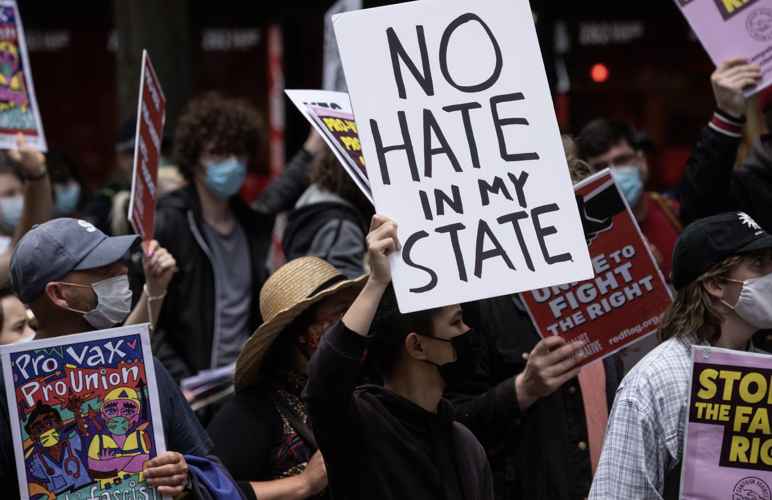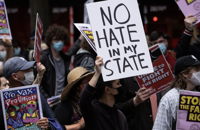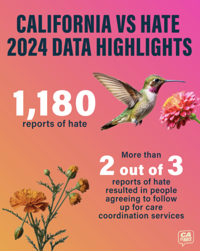
CA vs Hate was launched in 2023 in direct response to an alarming increase in reported hate crime events across the country. Photo by Mitchell Luo
The California Civil Rights Department (CRD) released new statistics demonstrating ongoing demand for support and resources for survivors of hate incidents and crimes.
The new data from California vs Hate, the state’s first-ever multilingual statewide hotline and online portal, showed that nearly 1,200 reports of hate were made across nearly 50 different counties in 2024.
More importantly, the latest report also indicated survivors’ need for services after witnessing or experiencing a hate incident, after more than two-thirds of reports resulted in people agreeing to follow up for care coordination services.
“[California vs Hate] is the first non-law enforcement statewide reporting hotline that is run by the state. It is a model for doing this kind of work,” Kevin Kish, director of the CRD, told CALÓ News.
Kish also said that given the recent increased immigration apprehensions in L.A. and the fear and tension that it has brought to many of the people living in the Golden State, CA vs Hate has been able to be a safe place for everyone to anonymously report hate, regardless of their immigration status.
“One of the problems when it comes to hate is that we don't have good data because there are a lot of people who don't report to law enforcement. There are people who might not feel comfortable contacting law enforcement for various reasons, including because of their immigration status,” he said. “The California vs Hate hotline is not law enforcement.”
The hotline is run by CRD in partnership with community organizations across California and is operated by 211, using a trauma-informed, victim-centered approach to help connect people who report with resources. Hate acts can be reported in 15 different languages through the online portal and in over 200 languages when calling the hotline.
It was launched in 2023 in direct response to an alarming increase in reported hate crime events across the country, which, in California, increased by over 50% from 1,330 in 2020 to 2,023 in 2024.
Underreporting continues to be an issue for various reasons, including a lack of in-language services, fear of retaliation or that nothing will be done, or, as previously mentioned, distrust of law enforcement.
State Senator Lena Gonzalez (D-33), chair of the California Latino Legislative Caucus, also touched on federal immigration officers and their practices of racially profiling individuals based on their perceived legal status or appearance.
“As communities are terrorized by discriminatory federal immigration tactics, where people are targeted based on the color of their skin or the language they speak, resources like the CA vs Hate hotline are incredibly important,” Gonzalez said. “The latest data reveals that over 40% of reports to the CA vs Hate hotline involved racial or ethnic bias, with overall hate crime reports increasing by more than half in just the past few years.”
The newly released report also included data on 49 of California’s counties, including all 10 of the state’s most populous counties. According to the data, the largest number of reports in the entire state comes from L.A. County.
Kish explained that this is because L.A. County is the most populous county in the state. ”That is where we are seeing the most reports coming from and L.A. County is unique because we also have LA vs Hate, which is run by the County of Los Angeles. When we're talking about L.A. specifically, we've got law enforcement data, but then we have these two other sources: L.A. vs Hate and CA vs Hate.”
LA vs Hate was launched in 2019 by the L.A. County Commission on Human Relations to help residents report hate crimes and get support through a free, confidential hotline.

The new data from California vs Hate showed that nearly 1,200 reports of hate were made across nearly 50 different counties in 2024. Photo courtesy of California vs Hate
Kish said the local organization also inspired the creation of the statewide effort that is now CA vs Hate. “They've been incredibly helpful in helping us set up our statewide hotline and our statewide hotline is modeled on what L.A. County has done.”
The report also showed that racial or ethnic bias hate crimes were mentioned in 44% of reports, followed by gender identity, sex or sexual orientation (23%), religion (13%) and disability status (12%).
Bamby Salcedo, president and chief executive officer of the TransLatin@ Coalition in L.A., touched on the hate crimes.
“CA vs Hate is a lifeline for our two-spirit, trans, gender expansive and intersex (2TGI) siblings. In a world that too often silences and targets us, this initiative says loud and clear: we see you, and we hear you. It’s about affirming our dignity, holding systems accountable and building a California where we can all live safely, authentically and with pride,” she said.
Kish said that while reports to CA vs Hate serve as an important indicator, it is important to note that they should not be treated as representative of all acts of hate in California. The data is based on self-reported information from people who have experienced an act of hate.
According to the report, in the first full year of the hotline, some of the most reported locations where hate crimes or incidents happened were in residential places (31%), public facilities or businesses (18%) and at work (12%).
Kish said having two out of three people agreeing to follow up for care coordination services after reporting a hate crime puts into perspective the way people continue to be more receptive to receiving help. Resources offered in the hotline are meant to address the person's specific needs, and Kish said it depends on the circumstances.
“We have connected people to the California Victims Compensation Board, which exists to compensate victims of crime, and we've connected people with legal aid services, housing assistance and other things,” he said.
Kish said reporting helps people across California know that they are not alone in the face of hate. It also helps policymakers better understand what is happening in their communities and it gives Californians a way to take direct action against hate and promote safety.
“There is no place for hate in California,” California Attorney General Rob Bonta said. “Everyone has a role to play in tackling discrimination and bias as we continue to work to build a safer, more decent California for us all.”
_____________________________________________________
If you witness or experience an act of hate, you can report it by calling 833-8-NO-HATE or visiting CAvsHate.org. Reporting is available in 200+ languages over the phone and 15 languages online.













(0) comments
Welcome to the discussion.
Log In
Keep it Clean. Please avoid obscene, vulgar, lewd, racist or sexually-oriented language.
PLEASE TURN OFF YOUR CAPS LOCK.
Don't Threaten. Threats of harming another person will not be tolerated.
Be Truthful. Don't knowingly lie about anyone or anything.
Be Nice. No racism, sexism or any sort of -ism that is degrading to another person.
Be Proactive. Use the 'Report' link on each comment to let us know of abusive posts.
Share with Us. We'd love to hear eyewitness accounts, the history behind an article.